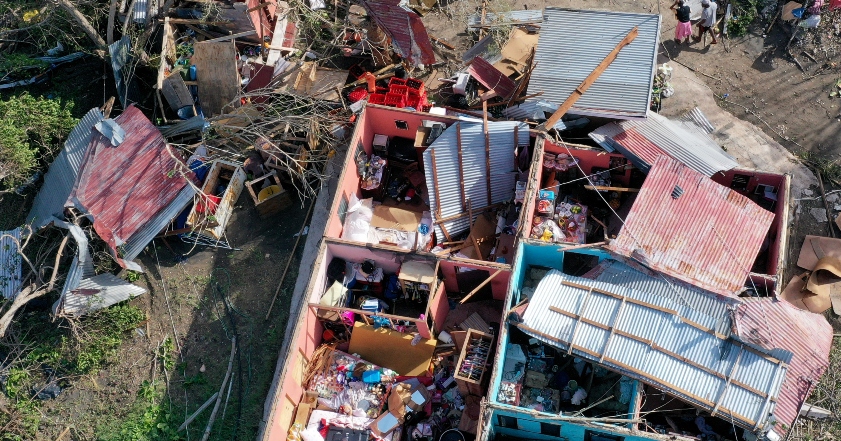Press release – 10 July
- Interviews available with ShelterBox team in Caribbean
- Tens of thousands of people left without shelter
An emergency response team from the UK charity ShelterBox has arrived in the Caribbean ready to respond, if needed, with emergency shelter aid for people left homeless by Hurricane Beryl.
The hurricane has caused widespread damage and made records for all the wrong reasons, becoming the strongest in history to form in the Atlantic Ocean in June. It first made landfall in St Vincents and the Grenadines, and Grenada, before moving along the southern coast of Jamaica, the Yucatán Peninsula of Mexico, and on towards Texas.
Winds of up to 150mph barreled through island nations, blowing roofs off houses, uprooting trees, and bringing down power lines. The damage is extensive with almost all homes on some islands destroyed, leaving people unable to return home.
Emergency Response Manager, Dave Raybould, is leading the ShelterBox team deployed to Barbados. He says: “We’re in Barbados because although it has been affected by the hurricane, it isn’t as bad here as other nearby islands and so this is where a lot of the aid efforts are being coordinated.
“There is a huge amount of destruction across a very wide area. There are a lot of different places where people need help. That means the humanitarian response will span nations and borders. That isn’t easy – especially when airstrips and ports are damaged, and there is no power in some places.
“Logistically, it’s going to be very challenging, but we have worked in the region before and have a pretty good idea of what we’re facing.”
Aid pre-positioned
ShelterBox has experience working with people affected by hurricanes in the Caribbean, responding to Irma and Maria in 2017. The charity anticipates where aid may be needed ahead of time as part of its preparedness work and has stocks regionally in Panama.
“Having aid pre-positioned around the world means that once we figure out what’s needed, where, when, and by whom, we should be able to move fairly quickly,” says Dave.
“Our focus now is on the details and talking with other humanitarians so that the right aid gets to the right people in the right places.
“The worst thing that can happen in situations like these is that everyone responds in one area and other places get forgotten.”
As well as houses, roads and crops have been destroyed making it harder for people to access food, water, and shelter.
Dave adds: “We’re seeing tropical storms getting more powerful, hitting the same places more often, and lasting longer.
“Extreme weather is common in the Caribbean and while people are prepared, they often don’t have time to recover from one emergency before the next arrives.
“It is always those who are poorest and most vulnerable, living in homes that are less well built, that face the brunt of a disaster – and it’s no different with Hurricane Beryl.”
Addressing ‘loss and damage’
Recovering nations and communities that have contributed the least to the climate crisis continue to face the impact of rising sea levels and more severe storms.
World leaders agreed at COP28 that they have a responsibility to address the disproportionate impact experienced by communities and countries made more vulnerable. However, little action has been taken so far. Should world leaders continue to fail to invest in recovery, preparation, and rebuilding, disasters will continue to follow extreme weather.
It’s not just world leaders that can be rethinking disasters. At ShelterBox we’re having to change the way we work to meet growing demand, by adapting our aid, thinking ahead, and scaling-up our responses.
ShelterBox has supported nearly three million people across the world with emergency shelter aid. It’s currently supporting people displaced by conflict in Gaza, Yemen, Syria, Burkina Faso, Cameroon, Ethiopia, Chad, and Mozambique. As well as to severe flooding in Malawi and Bangladesh.
For more information visit shelterbox.org.
ENDS
For more information contact the press office at ShelterBox via [email protected].
Notes to Editors
- Archive b-roll and images available on request.
- Interviews available.

